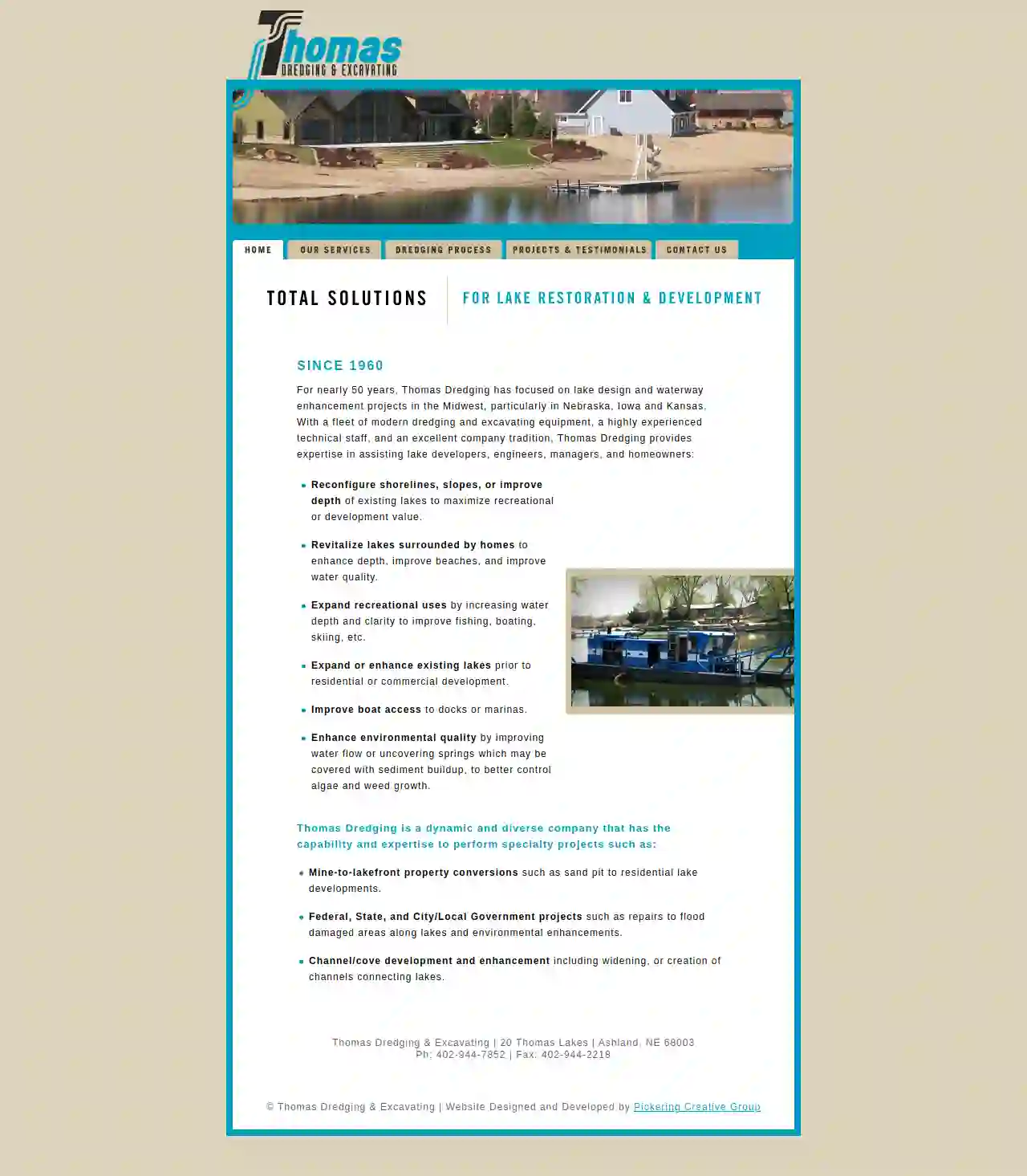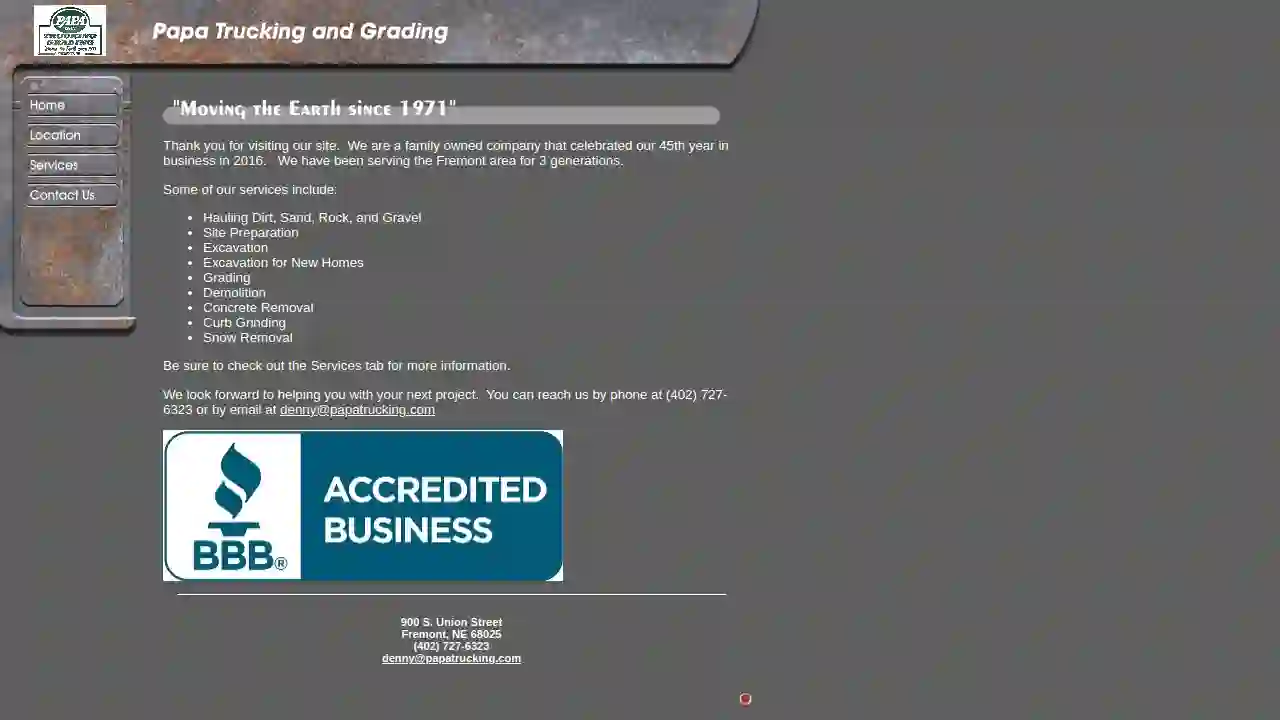Excavation Contractors Omaha
Top 10 Excavation Company Near Me in Omaha
Receive multiple Excavation Contractors Near Me quotes for your project today! Compare profiles, reviews, accreditations, portfolio, etc... and choose the best offer.
- Ru
Ruff Grading
53 reviewsOmaha, US- Services
- Why Us?
Get Quote - Kn
Knotheads Wood Services LLC
4.948 reviewsOmaha, US- Services
- Why Us?
Get Quote - Un
United Rentals - Trench Safety
58 reviewsOmaha, US- Services
- Why Us?
Get Quote - Ge
General Excavating
4.355 reviewsOmaha, US- Services
- Why Us?
Get Quote - Cl
Clark Excavating
1Omaha, US- Services
- Why Us?
Get Quote - SN
SNC Contractors
3.413 reviewsOmaha, US- Services
- Why Us?
Get Quote 
Thomas Dredging & Excavating
4.52 reviews20 Thomas Lakes, Ashland, 68003, USSince 1960 For nearly 50 years, Thomas Dredging has focused on lake design and waterway enhancement projects in the Midwest, particularly in Nebraska, Iowa and Kansas. With a fleet of modern dredging and excavating equipment, a highly experienced technical staff, and an excellent company tradition, Thomas Dredging provides expertise in assisting lake developers, engineers, managers, and homeowners: Reconfigure shorelines, slopes, or improve depth of existing lakes to maximize recreational or development value. Revitalize lakes surrounded by homes to enhance depth, improve beaches, and improve water quality. Expand recreational uses by increasing water depth and clarity to improve fishing, boating, skiing, etc. Expand or enhance existing lakes prior to residential or commercial development. Improve boat access to docks or marinas. Enhance environmental quality by improving water flow or uncovering springs which may be covered with sediment buildup, to better control algae and weed growth. Thomas Dredging is a dynamic and diverse company that has the capability and expertise to perform specialty projects such as: Mine-to-lakefront property conversions such as sand pit to residential lake developments. Federal, State, and City/Local Government projects such as repairs to flood damaged areas along lakes and environmental enhancements. Channel/cove development and enhancement including widening, or creation of channels connecting lakes
- Services
- Why Us?
- Gallery
Get Quote
Papa Trucking & Grading
4.513 reviewsOmaha, USPapa Trucking is a family-owned business that has been serving the Fremont area for three generations. We celebrated our 45th year in business in 2016. We are committed to providing our customers with high-quality services at competitive prices. We are proud of our reputation for reliability and customer satisfaction.
- Services
- Why Us?
- Gallery
Get Quote- Lo
Lovato Contracting LLC
1Omaha, US- Services
- Why Us?
Get Quote - Gr
Grefe Excavation LLC
53 reviewsOmaha, US- Services
- Why Us?
Get Quote
Over 21,512+ Excavation Contractors onboarded
Our excavation pros operate in Omaha and beyond!
ExcavationHQ has curated and vetted the Best Excavation Pros in Omaha. Find a trustworthy pro today.
Frequently Asked Questions About Excavation Contractors
- Trench Collapses: Unstable trench walls can cave in, posing a severe risk to workers. Proper shoring and sloping are crucial safety measures.
- Utility Damage: Striking underground utilities (gas, water, electric) can cause leaks, explosions, or electrocution. Accurate utility locates and careful digging are essential.
- Falling Objects: Materials or equipment falling into excavations can injure workers. Securing work areas and using appropriate safety gear is vital.
- Equipment Accidents: Operating heavy machinery involves risks of rollovers, collisions, or mechanical failures. Trained operators and proper equipment maintenance are critical.
- Environmental Hazards: Excavated soil might contain hazardous materials (asbestos, lead). Proper testing and disposal procedures are necessary.
- Basement Size: The larger the basement, the more excavation is required, increasing the cost.
- Soil Type: Excavating rocky or dense clay soil is generally more expensive than loose soil.
- Accessibility: Difficult-to-access sites might require specialized equipment or more labor, driving up costs.
- Foundation Type: The chosen foundation type (full basement, crawl space, slab) affects excavation needs.
- Underpinning: If underpinning (strengthening existing foundations) is necessary, it significantly increases costs.
- Disposal Fees: Hauling excavated soil to disposal sites adds to the overall expense.
- Project Size and Scope: The larger and more complex the excavation, the higher the cost.
- Soil Type: Different soil types require different equipment and techniques, impacting costs. Rocky or clay-rich soil can be more expensive to excavate than loose soil.
- Accessibility: Difficult-to-access sites might require specialized equipment or additional labor, increasing expenses.
- Disposal Costs: Hauling away excavated material (soil, rocks, etc.) to disposal sites incurs additional fees.
- Permits and Inspections: Depending on local regulations, permits and inspections might be required, adding to the overall cost.
- Mechanical Excavation: Utilizing heavy equipment like excavators, backhoes, bulldozers, and loaders, suitable for most projects.
- Hand Excavation: Using hand tools (shovels, picks) for smaller excavations or delicate work near utilities.
- Blasting: Employing explosives to break up rock or hard materials, typically for large-scale projects.
- Hydro Excavation: Using high-pressure water jets to loosen and remove soil, often used for locating utilities or delicate excavation.
- Vacuum Excavation: Employing a vacuum system to suck up excavated material, suitable for safe excavation near utilities or in confined spaces.
What are the risks associated with excavation?
How much does it cost to excavate a basement?
How much does excavation cost?
What are the different methods of excavation?
What are the risks associated with excavation?
- Trench Collapses: Unstable trench walls can cave in, posing a severe risk to workers. Proper shoring and sloping are crucial safety measures.
- Utility Damage: Striking underground utilities (gas, water, electric) can cause leaks, explosions, or electrocution. Accurate utility locates and careful digging are essential.
- Falling Objects: Materials or equipment falling into excavations can injure workers. Securing work areas and using appropriate safety gear is vital.
- Equipment Accidents: Operating heavy machinery involves risks of rollovers, collisions, or mechanical failures. Trained operators and proper equipment maintenance are critical.
- Environmental Hazards: Excavated soil might contain hazardous materials (asbestos, lead). Proper testing and disposal procedures are necessary.
How much does it cost to excavate a basement?
- Basement Size: The larger the basement, the more excavation is required, increasing the cost.
- Soil Type: Excavating rocky or dense clay soil is generally more expensive than loose soil.
- Accessibility: Difficult-to-access sites might require specialized equipment or more labor, driving up costs.
- Foundation Type: The chosen foundation type (full basement, crawl space, slab) affects excavation needs.
- Underpinning: If underpinning (strengthening existing foundations) is necessary, it significantly increases costs.
- Disposal Fees: Hauling excavated soil to disposal sites adds to the overall expense.
How much does excavation cost?
- Project Size and Scope: The larger and more complex the excavation, the higher the cost.
- Soil Type: Different soil types require different equipment and techniques, impacting costs. Rocky or clay-rich soil can be more expensive to excavate than loose soil.
- Accessibility: Difficult-to-access sites might require specialized equipment or additional labor, increasing expenses.
- Disposal Costs: Hauling away excavated material (soil, rocks, etc.) to disposal sites incurs additional fees.
- Permits and Inspections: Depending on local regulations, permits and inspections might be required, adding to the overall cost.
What are the different methods of excavation?
- Mechanical Excavation: Utilizing heavy equipment like excavators, backhoes, bulldozers, and loaders, suitable for most projects.
- Hand Excavation: Using hand tools (shovels, picks) for smaller excavations or delicate work near utilities.
- Blasting: Employing explosives to break up rock or hard materials, typically for large-scale projects.
- Hydro Excavation: Using high-pressure water jets to loosen and remove soil, often used for locating utilities or delicate excavation.
- Vacuum Excavation: Employing a vacuum system to suck up excavated material, suitable for safe excavation near utilities or in confined spaces.